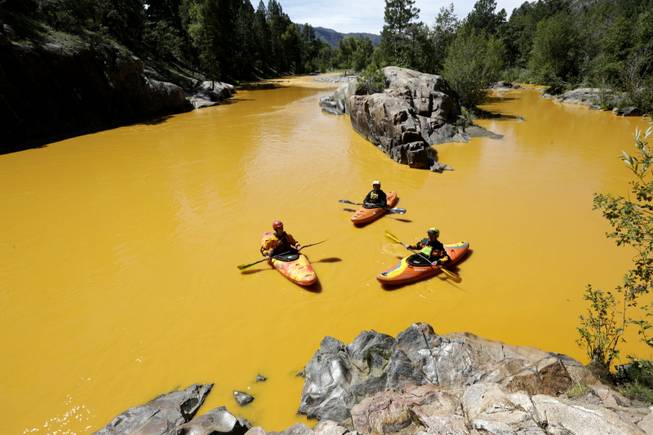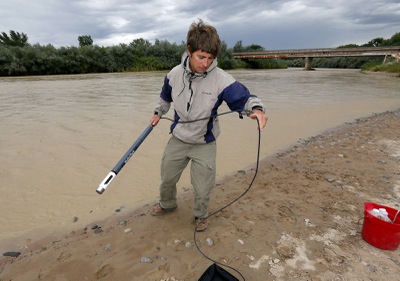
Jerry McBride / AP
In this Thursday, Aug. 6, 2015, photo, people kayak in the Animas River near Durango, Colo., in water colored yellow from a mine waste spill. A crew supervised by the U.S. Environmental Protection Agency has been blamed for causing the spill while attempting to clean up the area near the abandoned Gold King Mine.
Wednesday, Aug. 12, 2015 | 2 a.m.
Grand Canyon river guides have their fingers crossed.
The amber-toned plume of toxic mining waste spilled by the Environmental Protection Agency near Silverton, Colo., last week, is slowly snaking its way toward Lake Powell — whose southern tip serves as an entry point to the Grand Canyon.
In addition to threatening the environment, the waste is putting many businesses in peril.
The Las Vegas metro area, which sits about 300 miles away from Lake Powell, is the springboard for thousands of rafters every year, and, according to several rafting trip operators, those customers are increasingly raising concerns.
John Dillon started receiving phone calls as soon as the first harrowing images appeared on screens across the country. Dillon represents the Grand Canyon’s 16 commercial rafting guides as the executive director for the Grand Canyon River Rafters Association. Customers were worried that they would have to cancel their whitewater experience because of the contaminated water.
Dillion, along with local, state and federal officials, told travelers not to cancel. While towns, farmers and tribes in Colorado and New Mexico have had to close intake valves and declare emergencies, experts in Nevada say the heavy metals in the waste will dilute by the time they reach the Grand Canyon and Lake Mead.
“We’re open. We’re running. Everything is fine,” Dillon said.
The rafting industry is a lucrative one for Las Vegas. More than half of the 21,000 tourists who hire commercial outfits use the city as a launching or landing point on their trips. Dillon said the revenue from the raft trips is $35 million per year.
Despite what appears to be good news for the region, the disaster highlights the delicate balance of managing water for drinking, recreation and industry in the southwest. “The spill shows you how razor thin the margin of error is for water in the west,” Athan Manuel, director of the Sierra Club’s lands protection program, said.
The EPA spilled 3 million gallons of the toxic waste from the Gold King Mine near Durango, Colo., last week. That water has traveled more than 200 miles downstream via the Animas and San Juan Rivers in Colorado, New Mexico and Utah. Experts say it will enter Lake Powell in the coming days.
Much of the affected waterways — also home to whitewater rafting, fishing and other recreation — has been closed to the public.
Matt Gerhardt, general manager of Four Corners Riversports, a river outfitter located in Durango 60 miles south of the spill’s epicenter, said the rafting branch of his business lost $10,000 since the spill.
“But the reality is that this stuff has been leaking into our rivers for years,” he said. “There are thousands of mines that are ticking time bombs.”
Gerhardt said the orange hue no longer shimmers on the top of the Animas river. but heavy metals from the waste have sunk into the sediment. “What’s been left behind is the problem,” he said.
The risk of contamination is minimal, said Corey Enus, spokesman for the Southern Nevada Water Authority.
The 3 million gallons in the spill are dwarfed by the 4 trillion gallons of water held in Lake Powell, said Rusty Harris-Bishop, a spokesman for the EPA. “I can’t imagine that we are going to detect anything once it gets there,” he said.


Join the Discussion:
Check this out for a full explanation of our conversion to the LiveFyre commenting system and instructions on how to sign up for an account.
Full comments policy